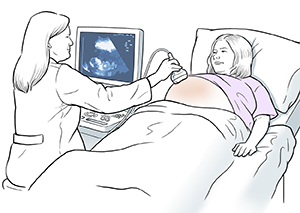Pregnancy and Childbirth: Fetal Growth Restriction
With fetal growth restriction, an unborn baby is smaller than normal. This means the baby is not growing at a normal rate.
Causes of fetal growth restriction
Fetal growth restriction happens when a baby doesn't get enough oxygen and nutrition in the uterus. It's also called intrauterine growth restriction. Possible causes are certain health problems in the mother such as:
-
High blood pressure
-
Heart disease
-
Kidney disease
Other possible causes include the baby having:
-
A genetic disorder
-
An infection
This condition is much more likely if the mother:
Diagnosing fetal growth restriction
 |
| Your healthcare provider may use ultrasound exams to check your baby's growth. |
During routine visits, you and your baby are closely watched. This is done with ultrasound tests. The height of your uterus (fundal height) is also measured. A baby with fetal growth restriction will have smaller ultrasound and fundal height measurements. Doppler ultrasound is used to measure how well the placenta is working. You may have a test (amniocentesis) to look for a genetic problem or infection. It tests a fluid sample taken from around the baby (amniotic fluid).
Treating fetal growth restriction
The growth of a baby with fetal growth restriction will continue to be closely watched. Any treatment depends on the cause. If the mother smokes, drinks, or uses drugs, stopping is vital. In other cases, treatments may include:
-
Bed rest. This helps increase blood flow to the placenta.
-
Self-care. Eat a healthy, well-balanced diet with a calorie intake that is advised for a pregnant woman. Keep all your prenatal visits with your healthcare provider.
-
Medicines. These treat health problems such as high blood pressure.
-
Early delivery. This may be needed if the baby’s health is in danger.
Talk with your healthcare provider about the best treatment for you and your baby.
Long-term concerns
A baby diagnosed with fetal growth restriction may have health problems after birth. These include trouble fighting infections or keeping a normal body temperature. With treatment and close follow-up, babies may catch up in growth. In some cases, babies have long-term health problems. Your healthcare provider can tell you more.
Online Medical Reviewer:
Donna Freeborn PhD CNM FNP
Online Medical Reviewer:
Heather M Trevino BSN RNC
Online Medical Reviewer:
Irina Burd MD PhD
Date Last Reviewed:
7/1/2022
© 2000-2024 The StayWell Company, LLC. All rights reserved. This information is not intended as a substitute for professional medical care. Always follow your healthcare professional's instructions.